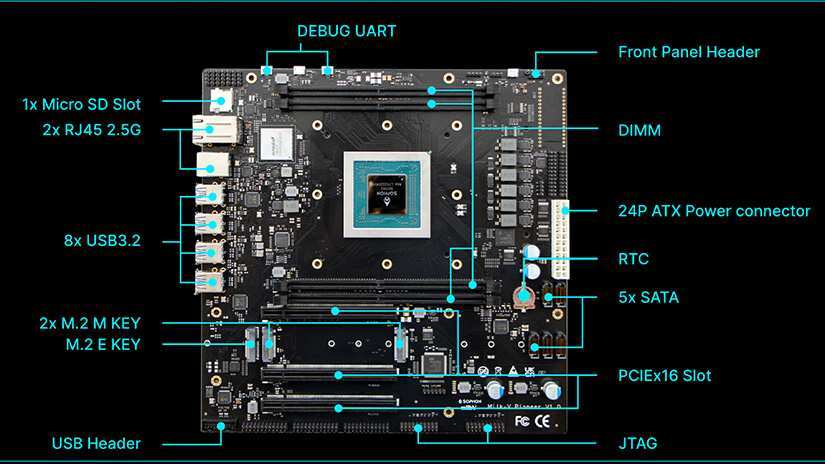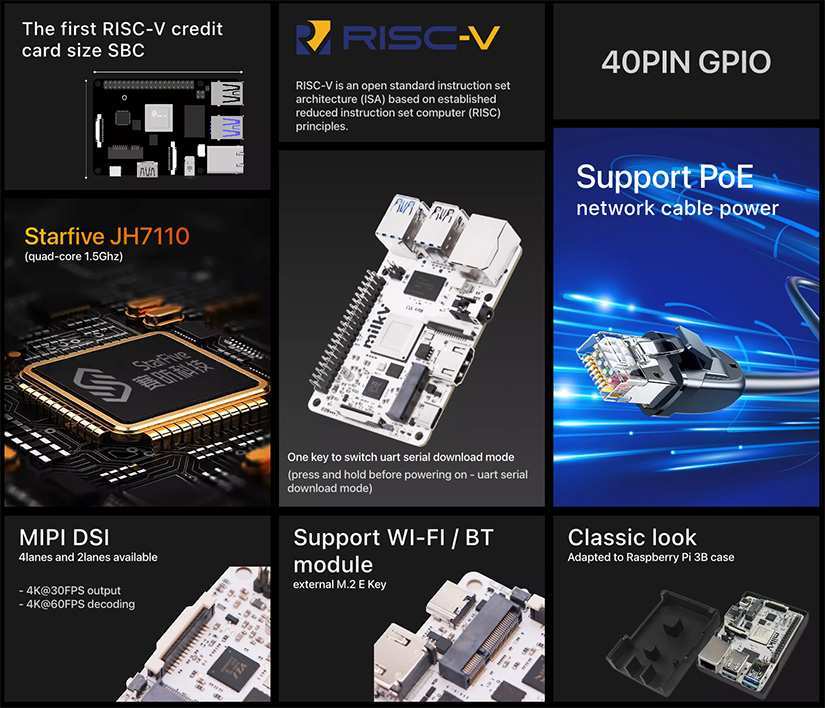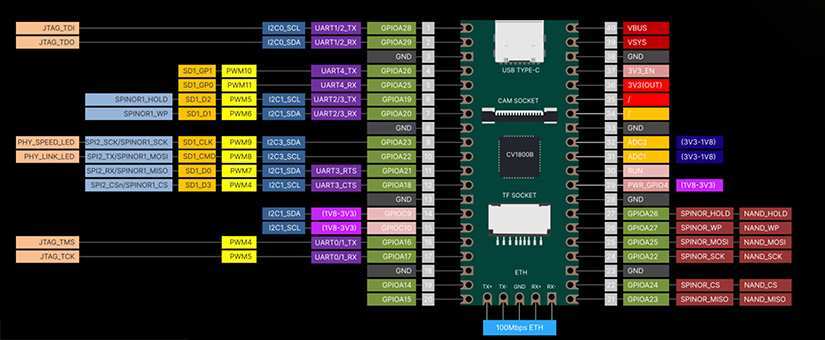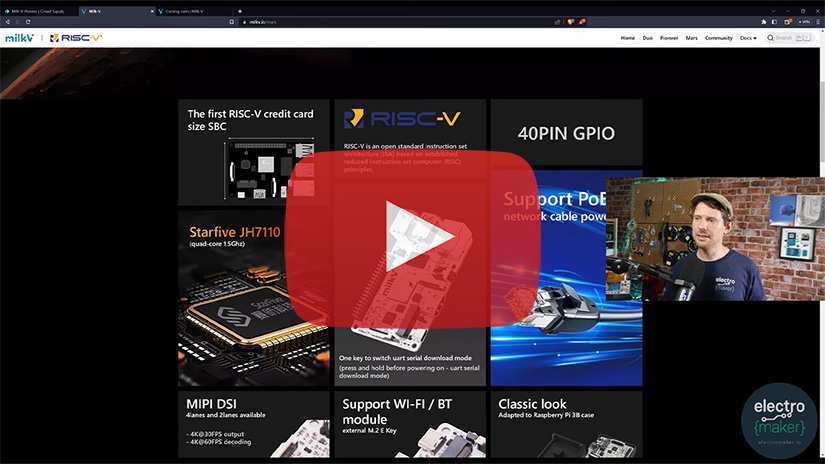Milk-V Go All in on RISC-V with 3 Different DevKits
China-Based Milk-V has announced three separate RISC-V development boards targeting different types of development. From the miniATX-sized Pioneer motherboard down through the Pi 3B form factor Mars board, to the miniature Duo - a pico-sized mini-computer - they've cast a wide net.
Milk-V (sometimes written as MilkV in their copy) is yet to release these boards (though the Duo is available in mainland China), but the specs look impressive. We look over all the specs and potential audiences for all three boards in this week's Electromaker Show:
So, what makes these boards special? Let's start with the Milk-V Pioneer.
Milk-V Pioneer: A Fully Open Source Computer
Milk-V Pioneer is a developer motherboard that enables native RISC-V development and provides a RISC-V desktop experience. Powered by the SOPHON SG2042 chip, this mATX form factor motherboard offers a 64-core RISC-V CPU with a maximum frequency of 2GHz. It boasts features like 64KB L1 cache, 1MB/cluster L2 cache, and a 64MB system cache. The Pioneer Board includes PC-like interfaces and industrial compatibility (thanks to RJ45 and JTAG ports), making it an ideal choice for RISC-V developers and hardware enthusiasts seeking cutting-edge technology.

While it isn't going toe to tow with your custom gaming PC build, the hardware specifications of the Pioneer Board are impressive, including 4 DDR4 DIMM slots supporting up to 128GB RAM, 3 PCIe x16 slots, 5 SATA ports, 8 USB3 ports, and multiple M.2 slots. Additionally, it offers dual 2.5G RJ45 Ethernet ports, JTAG debug ports, a micro USB debug console, and various other connectivity options.
Milk-V offers the board with CPU stand-alone - price TBC - but they will also provide a pre-built option in a travel case. The Pioneer Box is a complete RISC-V PC solution based on the Pioneer Board, bundled with 32GB or 128GB 3200 DDR4 RAM, a 1TB PCIe 3.0 SSD, an Intel X520-DA2 Network Card with 2x 10Gbps SFP ports, an AMD R5 230 Graphic Card, an MSI A350 350W Power Supply, and a cooler with PWM fan.
Currently, there's no price for the board or box, but there is a (pre-launch at the time of writing) Crowd Supply campaign for the board where you can register interest. We'll definitely be returning to it on the Electromaker Show when it goes live.
For now, you can find out the info at the official Milk-V Pioneer Page, and read the documentation for the board on the Pioneer Docs page.
Milk-V Mars: Pi 3 in RISC-V Clothing?
Up next is the Milk-V Mars, a Single Board Computer (SBC) with a very familiar form factor.

This familiarity goes beyond a passing resemblance. This board has been designed to fit the Raspberry Pi 3B dimensions perfectly, making all cases, heatsinks, and fans compatible with it.
In terms of hardware specifications, the SoC is equipped with the StartFive JH7110 64-bit SoC with RV64GC architecture supporting up to 8GB of LPDDR4 memory, while storage options include an eMMC slot and a Micro SD slot. The Milk-V Mars SBC supports camera connectivity with MIPI CSI, allowing for H.264 and H.265 4K@60fps decoding, as well as H.265 1080p@30fps encoding. With multiple USB ports, Gigabit Ethernet with Power over Ethernet (PoE) capability, and GPIO options, this compact board offers versatile integration possibilities. It can be powered via the USB-C port or GPIO header with a minimum 3A+ power supply.
While there's no benchmarking to be done until the board becomes available, notable hardware elements include the 3 USB 3.0 ports (if we are comparing to a Pi 3's 2), and the M.2 E-Key slot - designed for WiFi/BT connectivity, but useable for something else if desired.
Currently, Mars is not available, and there is no price attached to it, though it seems likely they will want to be somewhat competitive with other similar specced SBCs, so anywhere from $70-$100 seems like a decent bet. For more information, you can head to the official Mars page on the Milk-V website. Currently, no documentation exists for the board.
Pico Sized With Big Ambitions: Milk-V Duo
The final board in the trio is the Milk-V Duo, a remarkable seeming $9 RISC-V computer that combines low cost, low power consumption, and high performance in the familiar castellated/pinhole Raspberry Pi Pico format.

With a powerful Dual RV-64 RISC-V CPU running up to 1GHz and vector acceleration, this ultra-compact embedded development platform offers incredible potential for professionals, industrial ODMs, AIoT enthusiasts, DIY hobbyists, and creators. It comes equipped with 64MB of RAM, MicroSD support, and 40 GPIO pins, making it a versatile and capable computing solution. Also notable are 10/100GB Ethernet available via an expansion board (TBA) and an onboard MIPI CSI Dual lane camera port.
Milk-V Duo is based on the CV1800B chip and supports running both Linux and RTOS. In their product information, MilkV pegs the Duo as suitable for a wide range of applications, including smart door locks, intelligent monitoring systems, smart street lights, traffic monitoring, and pedestrian detection. The platform is designed to provide a reliable, cost-effective, and high-performance solution for various projects.
For detailed technical information, you can refer to the provided documentation, including the Duo Schematic, Mechanical Drawings, Schematic Library, and PCB Footprint.
Milk-V is Making a Splash
It's early days, but every one of these boards seems exciting for different reasons and use cases. On a personal level, the Duo grabs me as an interesting take on the MCU dev board in general, given its form factor and potential I/O and OS options.
For more information about any of the three boards, you can head to the Milk-V website, which links to everything discussed here in the top bar. There is also an online forum featuring discussions about all three boards.
For further inquiries, you can reach out to their sales, development, or customer support departments via email (linked at the bottom of their home page). Milk-V Technology also offers a Matrix Chat channel and WeChat group. Presumably, other communities will appear once the boards are available worldwide.















































Leave your feedback...